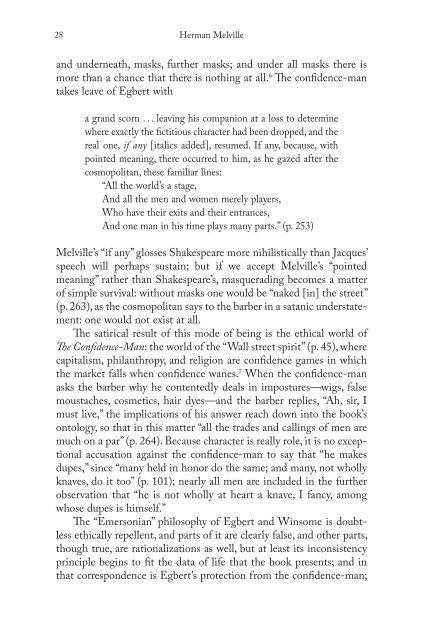Blooms Literary Themes - THE TRICKSTER.pdf - ymerleksi - home
Blooms Literary Themes - THE TRICKSTER.pdf - ymerleksi - home
Blooms Literary Themes - THE TRICKSTER.pdf - ymerleksi - home
Create successful ePaper yourself
Turn your PDF publications into a flip-book with our unique Google optimized e-Paper software.
28<br />
Herman Melville<br />
and underneath, masks, further masks; and under all masks there is<br />
more than a chance that there is nothing at all. 6 Th e confi dence-man<br />
takes leave of Egbert with<br />
a grand scorn . . . leaving his companion at a loss to determine<br />
where exactly the fi ctitious character had been dropped, and the<br />
real one, if any [italics added], resumed. If any, because, with<br />
pointed meaning, there occurred to him, as he gazed after the<br />
cosmopolitan, these familiar lines:<br />
“All the world’s a stage,<br />
And all the men and women merely players,<br />
Who have their exits and their entrances,<br />
And one man in his time plays many parts.” (p. 253)<br />
Melville’s “if any” glosses Shakespeare more nihilistically than Jacques’<br />
speech will perhaps sustain; but if we accept Melville’s “pointed<br />
meaning” rather than Shakespeare’s, masquerading becomes a matter<br />
of simple survival: without masks one would be “naked [in] the street”<br />
(p. 263), as the cosmopolitan says to the barber in a satanic understatement:<br />
one would not exist at all.<br />
Th e satirical result of this mode of being is the ethical world of<br />
Th e Confi dence-Man: the world of the “Wall street spirit” (p. 45), where<br />
capitalism, philanthropy, and religion are confi dence games in which<br />
the market falls when confi dence wanes. 7 When the confi dence-man<br />
asks the barber why he contentedly deals in impostures—wigs, false<br />
moustaches, cosmetics, hair dyes—and the barber replies, “Ah, sir, I<br />
must live,” the implications of his answer reach down into the book’s<br />
ontology, so that in this matter “all the trades and callings of men are<br />
much on a par” (p. 264). Because character is really role, it is no exceptional<br />
accusation against the confi dence-man to say that “he makes<br />
dupes,” since “many held in honor do the same; and many, not wholly<br />
knaves, do it too” (p. 101); nearly all men are included in the further<br />
observation that “he is not wholly at heart a knave, I fancy, among<br />
whose dupes is himself.”<br />
Th e “Emersonian” philosophy of Egbert and Winsome is doubtless<br />
ethically repellent, and parts of it are clearly false, and other parts,<br />
though true, are rationalizations as well, but at least its inconsistency<br />
principle begins to fi t the data of life that the book presents; and in<br />
that correspondence is Egbert’s protection from the confi dence-man;

















